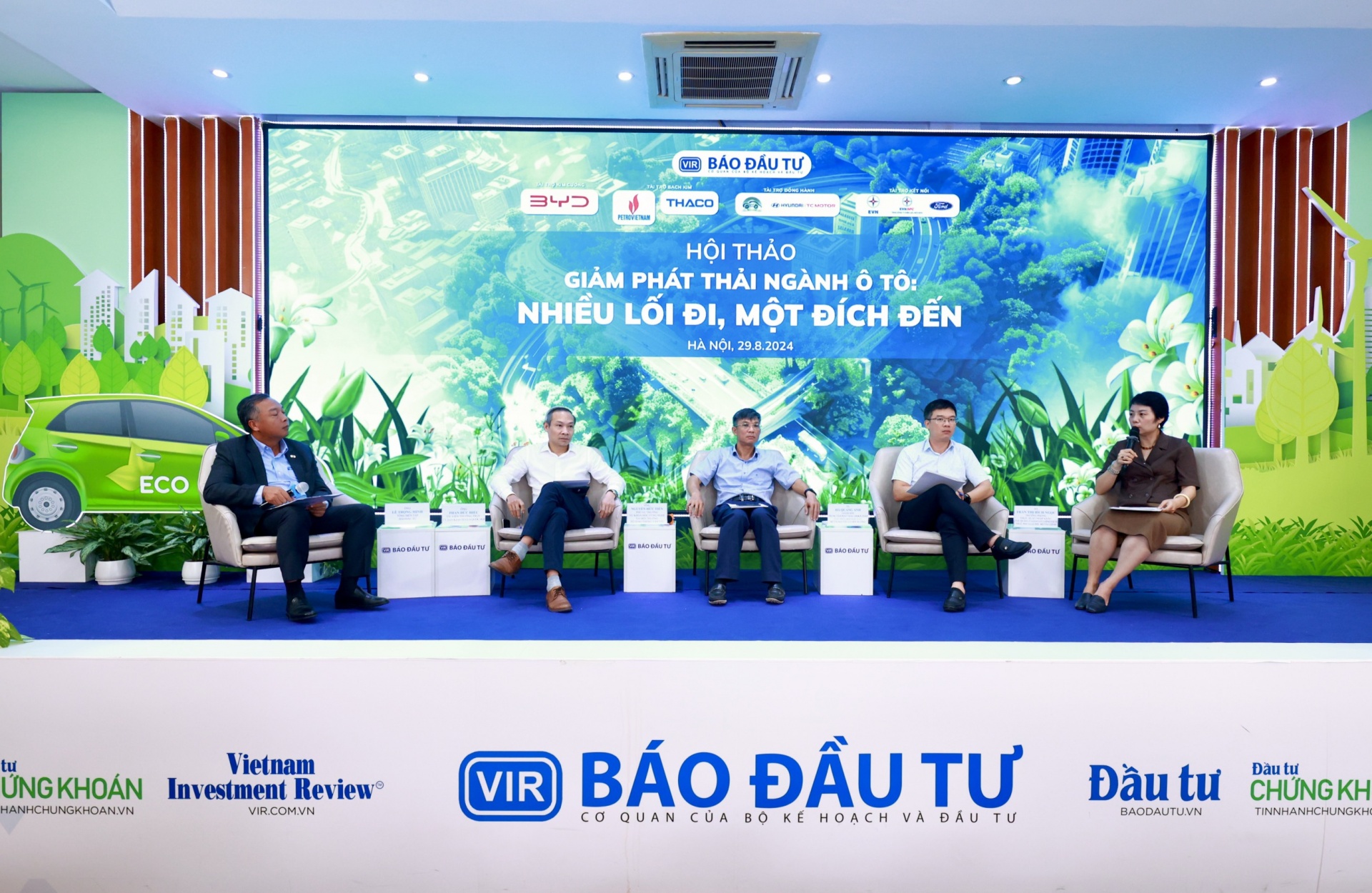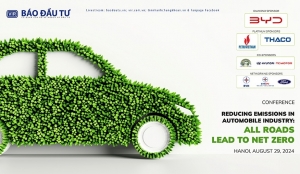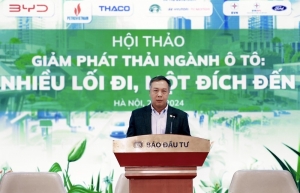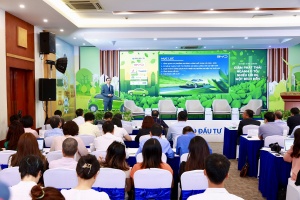Vietnam formulates policies to promote shift to EVs
 |
Speaking at a VIR's conference on reducing emissions in the automotive industry on August 29, Ha Quang Anh, director of the Centre for Low Carbon Development at the Department of Climate Change under Ministry of Natural Resources and Environment, said, "Net zero is a balance between development and the environment as well as a balance between carbon emissions and absorption. It is vital to boost greenhouse gas (GHG) emission absorption while reducing overall emissions. This is particular true in the transportation sector, as Vietnam's total transport GHG emissions are projected to reach 89 million tonnes by 2030."
"At the COP26 climate conference, the PM made a commitment to cut net emissions to zero by the middle of the century. Since 2021, regulatory bodies have been issuing relevant policies to achieve the goal. Businesses are responsible for complying with these regulations, while citizens have to change their awareness and take action," Anh said.
However, one challenge is securing green financing to accommodate changes and upgrade technology. A balance must be achieved between business development and green finance. Another challenge is a lack of trained workers to achieve the ambitious climate goals, he added.
In the same vein, Nguyen Huu Tien, deputy director of the Department of Science, Technology, and Environment under the Ministry of Transport (MoT), said, "Economic development in line with green growth has become a worldwide trend. After the PM made the commitments at COP26, the government has taken strong and drastic measures, such as Decision No.876/QD-TTg dated July 22, 2022, which outlines a roadmap for the transportation sector to achieve net-zero emissions by 2050. The PM has also issued the National Green Growth Strategy for 2021-2030, with a vision to 2050."
"We have built a detailed plan from reviewing regulations to implementation. Some regulations have been issued to promote the development of EVs. Localities such as Hanoi and Ho Chi Minh City have plans to use electric buses to gradually replace fossil fuel-powered vehicles," he said.
In addition, the MoT is collecting feedback from other ministries to report to the PM about upcoming policies, including tax (Ministry of Finance), charging stations (Ministry of Industry and Trade), and charging stations at apartment towers (Ministry of Construction). The MoT has issued standards for rest stops on highways, requiring them to install EV charging stations, he added.
Tran Thi Bich Ngoc, head of the Department of Administration Supervision on Tax, Fees and Charges under the Ministry of Finance (MoF), said, "The Vietnamese government is paying special attention to the development of the automotive industry. As a result, Vietnam’s automotive industry has made great strides and attracted many local and foreign carmakers to develop assembly lines here. The MoF has proposed specific policies to the government to facilitate carmakers."
Specifically, Decree No. 57/2020/ND-CP has added environmentally friendly car lines into the Tax Incentive Programme. Decree 57 provides a preferential import tax rate of zero for raw materials, supplies, and components that have not been domestically produced in the automotive industry. In 2023, the ministry submitted Decree No. 25/2020/ND-CP to replace Decree No. 57. These incentives will last until 2027. Subsequently, the MoF will conduct a review for proper adjustments.
"The MoF has also submitted to the government and National Assembly the amended draft law on the Special Consumption Tax (SCT), levying a very low rate on EVs in a range from 1-3 per cent from 2022-2027. After 2027, the SCT on EVs will increase to 4–7 per cent. On the other hand, fossil fuel-powered vehicles are subject to a tax rate from 35 per cent to 150 per cent," she said.
Phan Duc Hieu, standing member of the National Assembly's Economic Committee, said, "If there are better policies in place, businesses can do better and support the government to achieve shared goals. Vietnam needs to develop a clear policy framework outlining goals and contents to encourage the development of EVs. Policies should promote long-term investments in favour of e-mobility."
"It is also vital to foster the development of Vietnam’s EV ecosystem with incentives for EV makers, charging stations, and electricity prices," Hieu said. "First, we should design policies with clear goals. One concern is the definition of locally-produced vehicles and localisation rates. Second, we should design policies wisely. It is not wise to stimulate demand by lowering taxes. Third, we should have broad vision. It is crucial to invest in EV batteries to build the EV ecosystem."
 | Supporting a green strategy for the automotive industry With 6.5 million cars and 74 million motorcycles, Vietnam is the second-largest emitter of greenhouse gases (GHGs) from road transport in Southeast Asia, following Indonesia. Emissions from road vehicles in the country are rising rapidly, with an average annual increase of about 15 per cent over the past decade. |
 | VIR conference promotes green solutions in automotive industry VIR hosted a conference on reducing emissions in the automotive industry themed “All Roads Lead to Net Zero” on August 29, with a view to accelerating the shift towards sustainable mobility. |
 | Long road ahead to green the vehicle industry Greening the automotive industry in Vietnam is the only way towards its sustainable development, a conference on the issue has heard. |
What the stars mean:
★ Poor ★ ★ Promising ★★★ Good ★★★★ Very good ★★★★★ Exceptional
 Tag:
Tag:
Related Contents
Latest News
More News
- Vietnam sets ambitious dairy growth targets (February 24, 2026 | 18:00)
- Masan Consumer names new deputy CEO to drive foods and beverages growth (February 23, 2026 | 20:52)
- Myriad risks ahead, but ones Vietnam can confront (February 20, 2026 | 15:02)
- Vietnam making the leap into AI and semiconductors (February 20, 2026 | 09:37)
- Funding must be activated for semiconductor success (February 20, 2026 | 09:20)
- Resilience as new benchmark for smarter infrastructure (February 19, 2026 | 20:35)
- A golden time to shine within ASEAN (February 19, 2026 | 20:22)
- Vietnam’s pivotal year for advancing sustainability (February 19, 2026 | 08:44)
- Strengthening the core role of industry and trade (February 19, 2026 | 08:35)
- Future orientations for healthcare improvements (February 19, 2026 | 08:29)






















 Mobile Version
Mobile Version